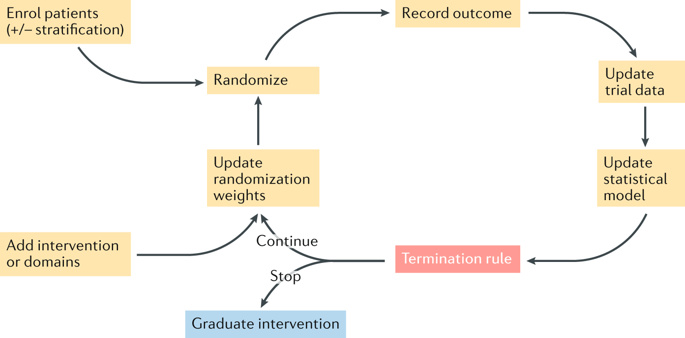当前位置:
X-MOL 学术
›
Nat. Rev. Drug. Disc.
›
论文详情
Our official English website, www.x-mol.net, welcomes your
feedback! (Note: you will need to create a separate account there.)
Adaptive platform trials: definition, design, conduct and reporting considerations.
Nature Reviews Drug Discovery ( IF 122.7 ) Pub Date : 2019-08-28 , DOI: 10.1038/s41573-019-0034-3
Nature Reviews Drug Discovery ( IF 122.7 ) Pub Date : 2019-08-28 , DOI: 10.1038/s41573-019-0034-3

|
Researchers, clinicians, policymakers and patients are increasingly interested in questions about therapeutic interventions that are difficult or costly to answer with traditional, free-standing, parallel-group randomized controlled trials (RCTs). Examples include scenarios in which there is a desire to compare multiple interventions, to generate separate effect estimates across subgroups of patients with distinct but related conditions or clinical features, or to minimize downtime between trials. In response, researchers have proposed new RCT designs such as adaptive platform trials (APTs), which are able to study multiple interventions in a disease or condition in a perpetual manner, with interventions entering and leaving the platform on the basis of a predefined decision algorithm. APTs offer innovations that could reshape clinical trials, and several APTs are now funded in various disease areas. With the aim of facilitating the use of APTs, here we review common features and issues that arise with such trials, and offer recommendations to promote best practices in their design, conduct, oversight and reporting.
中文翻译:

自适应平台试验:定义,设计,行为和报告注意事项。
研究人员,临床医生,政策制定者和患者对与治疗干预有关的问题越来越感兴趣,而这些问题对于传统的,独立的,平行分组的随机对照试验(RCT)来说很难或昂贵。示例包括以下场景:需要比较多种干预措施,以在具有不同但相关的状况或临床特征的患者亚组中生成单独的疗效评估,或希望最大程度地缩短试验之间的停机时间。作为回应,研究人员提出了新的RCT设计,例如自适应平台试验(APT),该设计能够以一种永久的方式研究疾病或病症的多种干预措施,并且干预措施基于预定义的决策算法进入和离开平台。APT提供的创新技术可能会重塑临床试验,目前,已经在各个疾病领域资助了一些APT。为了促进APT的使用,在这里,我们回顾了此类试验产生的共同特征和问题,并提出了一些建议,以促进其设计,实施,监督和报告中的最佳实践。
更新日期:2019-08-29
中文翻译:

自适应平台试验:定义,设计,行为和报告注意事项。
研究人员,临床医生,政策制定者和患者对与治疗干预有关的问题越来越感兴趣,而这些问题对于传统的,独立的,平行分组的随机对照试验(RCT)来说很难或昂贵。示例包括以下场景:需要比较多种干预措施,以在具有不同但相关的状况或临床特征的患者亚组中生成单独的疗效评估,或希望最大程度地缩短试验之间的停机时间。作为回应,研究人员提出了新的RCT设计,例如自适应平台试验(APT),该设计能够以一种永久的方式研究疾病或病症的多种干预措施,并且干预措施基于预定义的决策算法进入和离开平台。APT提供的创新技术可能会重塑临床试验,目前,已经在各个疾病领域资助了一些APT。为了促进APT的使用,在这里,我们回顾了此类试验产生的共同特征和问题,并提出了一些建议,以促进其设计,实施,监督和报告中的最佳实践。


















































 京公网安备 11010802027423号
京公网安备 11010802027423号